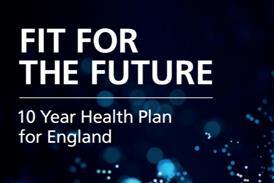- CQC has warned Shrewsbury and Telford Hospital could face action after an inspection exposed multiple safety concerns
- Staff across all areas of the trust raised concerns about “boarding” of patients which they felt was “undignified” and “disgusting”
- Two members of staff claimed patients were treated like “animals” and “cattle”
A troubled trust has been warned it could face enforcement action by the CQC amid claims by its own staff patients were being treated like “animals and cattle” in “unsafe, demeaning, undignified, and disgusting” conditions.
The Care Quality Commission has warned Shrewsbury and Telford Hospital Trust that it could be issued with a Section 31 notice and have conditions imposed on it after an unannounced inspection revealed widespread concerns about the quality of patient care.
A leaked letter from the regulator sent to the trust chief executive Simon Wright last week said patients were being treated in “inappropriate areas” that were “not designed for accommodating them.” This is known as “boarding” and can involve patients being treated in corridors or squeezed into extra spaces on wards but without access to piped oxygen or call bells.
According to staff, patients with high acuity and dependency needs would often be boarded for five to seven days.
The letter said: “Staff across all areas and grades raised concerns with us about this practice and told us they felt it was unsafe, demeaning, undignified, and disgusting.
“Two staff members told us they felt patients who were boarded were treated like ‘animals’ and ‘cattle’.”
The safety regulator’s warning comes as HSJ revealed dozens more cases of maternity failings at the trust which is already facing an independent inquiry.
The CQC said it was considering using its section 31 powers which would give it the ability to ultimately suspend a trust’s registration or impose restrictions on it.
The CQC advised the trust to seek legal advice due to the seriousness of the concerns it was raising.
In one example of poor practice, inspectors said a patient with a learning disability, who was fully dependent and “doubly incontinent”, was placed between two beds at the end of a ward.
“The patient told us they felt humiliated and ‘had not slept for days’. The patient and her daughter told us they had been placed in their underwear and a T-shirt in the area without screens,” the warning said.
Other concerns outlined by the CQC included:
- Staff in accident and emergency were not safely caring for patients when they were placed in corridor areas. One example was a patient placed in a corridor despite signs of sepsis and a early warning score of 10 – a significant warning sign of deterioration
- Multiple occasions where patients had to ask inspectors for help due to a lack of staff. In one instance, a patient with diabetes was forced to ask inspectors for help after they were left without food or fluids for 15 hours despite multiple requests
- Staffing deficits were having a negative impact on patient care and patient safety; there was at least one occasion where the trust’s high dependency area had no staff at all for 15 minutes
- Inspectors attempted to get a resuscitation trolley through areas but there was “inadequate” space for the equipment and no room for staff to access the patient or their bed
- Patients were detained under section 2 of the Mental Health Act with no process to appeal their detention, while some detained patients were deprived of their liberty without appropriate safeguards
- The trust’s discharge lounge was not staffed safely, with just two “unqualified staff” present
The CQC asked the trust to consider how it would respond to its concerns in order to ensure:
- Patients in the emergency department receive safe care and treatment including timely observations, monitoring and actions in relation to their condition
- There are robust systems to ensure all areas of the trust are safely staffed
- Patients are not detained unlawfully
- There are appropriate processes in place for patients to be accommodated at times of increased pressure
Simon Wright, chief executive for the trust, said the trust accepted the CQC’s findings and had a plan to address them.
He added: “Our teams work incredibly hard every day of the year to care for the 500,000 people of Shropshire, Telford & Wrekin and Mid Wales that we serve, and I and the Board will be doing everything in our power to make sure they can deliver that care in the safest and kindest way possible.”
In a statement to HSJ, Heidi Smoult, deputy chief inspector of hospitals, said: “As a result we discussed these concerns with the executive team and requested they took immediate action. We have written to the trust’s chief executive to advise that we are considering urgent enforcement action and to ask for evidence of the steps the trust has now taken to ensure patients are safe and protected from risk.
“We are currently reviewing the trusts response to determine whether use of our urgent enforcement powers is required, and we will report on our findings and any action we take in due course.”
Exclusive: Dozens more maternity failings exposed at scandal hit trust
- 1
- 2
 Currently reading
Currently readingCQC warning amid claim hospital patients treated like 'cattle'




























8 Readers' comments